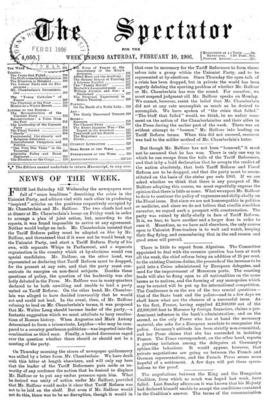On Thursday morning the storm of newspaper quidnuncery was stilled
by a letter 'from , Mr. Chamberlain. We have dealt with this letter at length elsewhere, and will only say here that the leader of the Tariff Reformers "puts aside as un- worthy of any credence the notion that he desired to displace Mr. Balfour or to put any undue pressure upon.him. What he desired was unity of action under Mr. Balfour, provided that Mr. Balfour would make it clear that Tariff Reform was not to .be laid on the shelf. But even if Mr. Balfour would not do this, there was to be no disruption, though it would in that ease be necessary for the Tariff Reformers to form them- selves into a group within the Unionist Party, and to be represented at by-elections. Since Thursday the open talk of a crisis has been dropped, but in private the world has been eagerly debating the sporting problem of whether Mr: Balfour or Mr. Chamberlain has won' the round. For ourselves, we must suspend' judgment till Mr. Balfour speaks on Monday. We cannot, however, resist the belief that Mr. Chamberlain did' not 'at any rate accomplish as muck as he desired to accomplish. We have spoken of " the crisis that failed." "The bluff that failed" would, we think, be no 'unfair com- ment on the action of the Chamberlainites and their allies in the Press during the earlier part of the week. There was an evident attempt to " bounce " Mr. Balfour into' leading on Tariff Reform terms. When this did not succeed, recourse was had to the milder method of Mr. Chamberlain's letter.










































